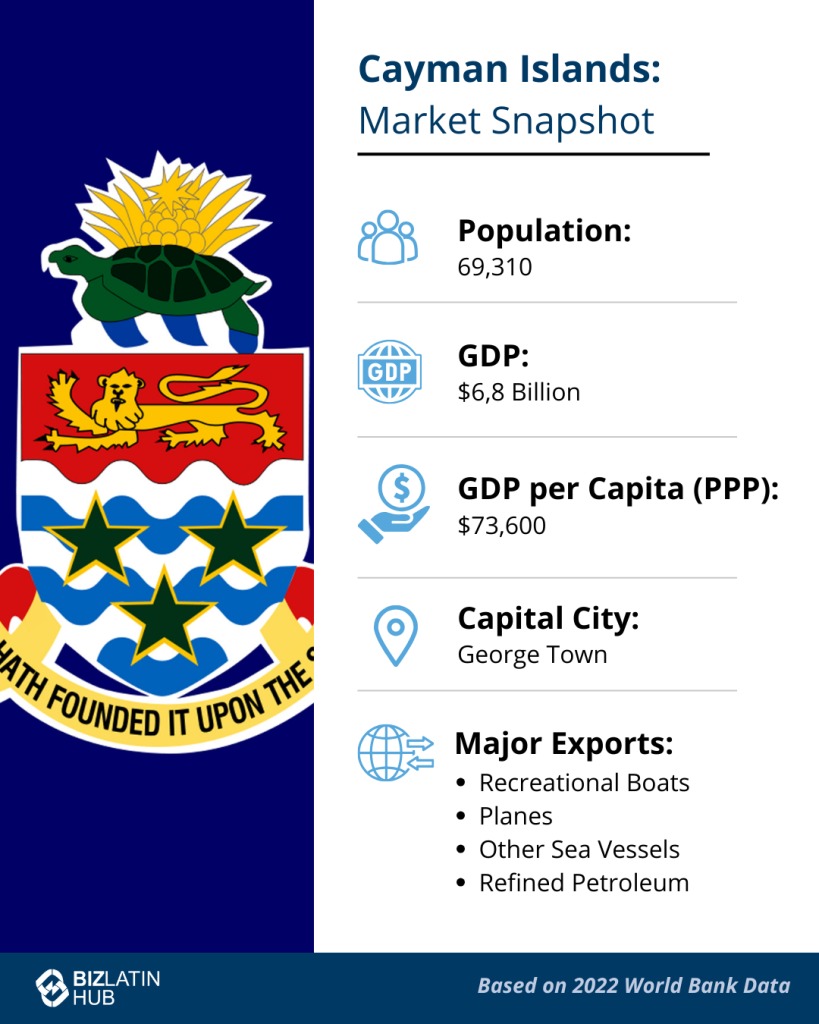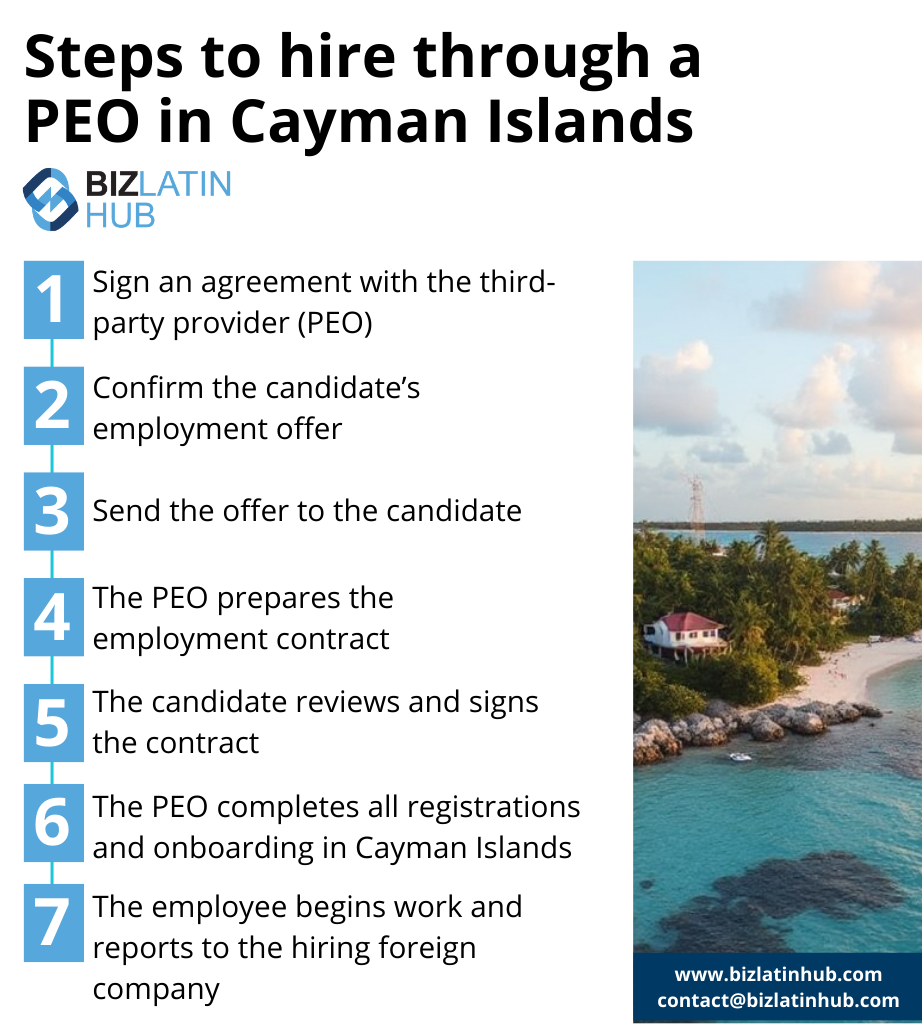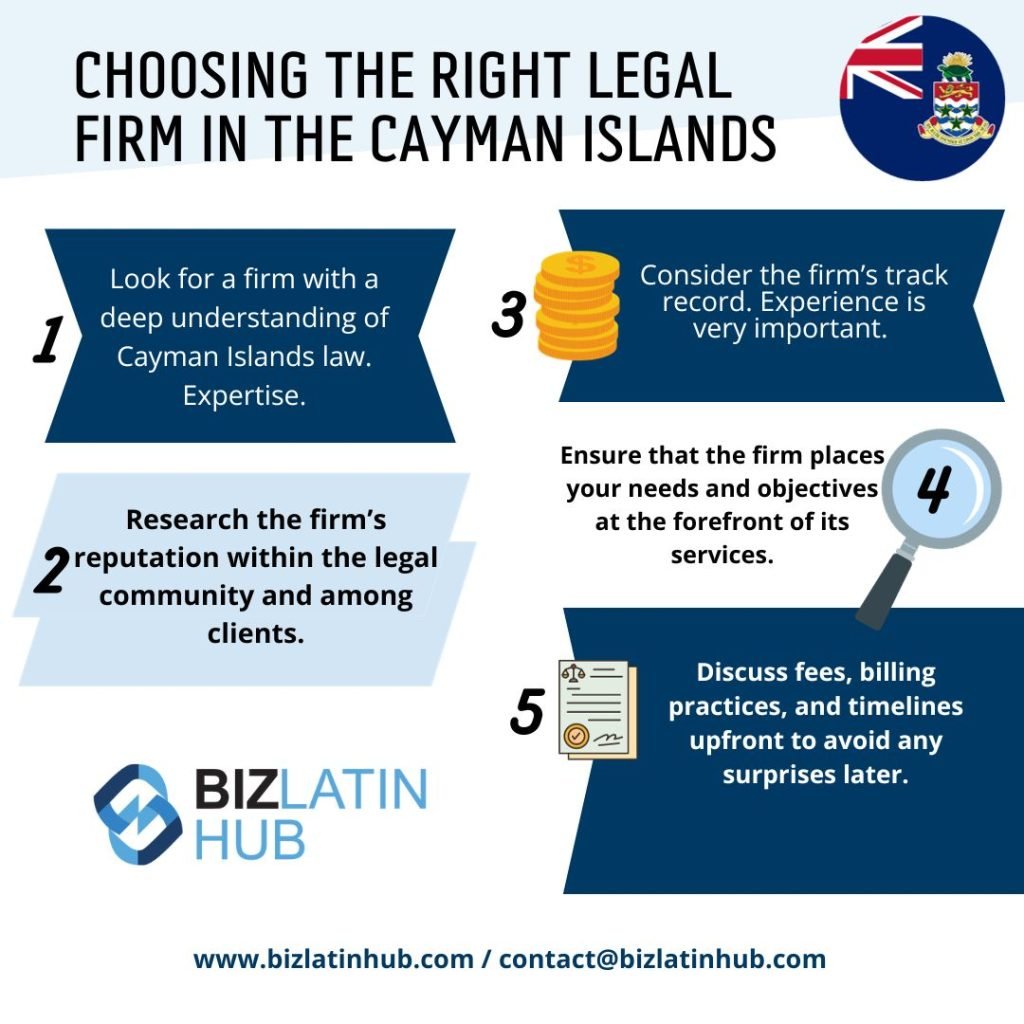Successfully hiring employees for company formation in the Cayman Islands requires understanding its distinct business environment. The Islands’ robust financial sector and appealing lifestyle draw global businesses and skilled professionals. A clear grasp of the Cayman Islands’ employment market is fundamental. Companies must diligently follow regulations concerning overtime and weekend work to ensure legal compliance and foster positive employer-employee relationships. This guide provides a step-by-step process for direct hiring and explores the alternative of using an Employer of Record for a more streamlined approach.
Key Takeaways: Hiring Employees in the Cayman Islands
| What are the two main options for hiring employees? | Direct hiring of employees or via an EOR service. |
| Can you hire foreign workers? | A work permit is required to hire any non-Caymanian employee. |
| What are the employer’s mandatory benefit contributions? | It is mandatory for employers to contribute to a registered pension plan and a standard health insurance plan for each of their employees. |
| Why use an EOR service? | An Employer of Record (EOR) can simplify the hiring process. |
| What are the key elements of a compliant employment contract? | The Labour Act requires this statement to include the job title, job description, and working hours, among other details. |
4 Steps to Hire Employees in the Cayman Islands
Step 1: Obtain a Business License
Before you can hire, your company must be licensed to operate locally by the Trade and Business Licensing Board.
Step 2: Secure a Work Permit (for non-residents)
To hire a non-Caymanian, you must apply for a work permit from Workforce Opportunities & Residency Cayman (WORC). This involves advertising the job locally first.
Expert Tip: Demonstrating Efforts to Hire Locally
From our experience, the most critical part of a successful work permit application is demonstrating to the Workforce Opportunities & Residency Cayman (WORC) that you have made a genuine effort to hire a qualified Caymanian for the role first. The application requires proof that the position was advertised locally on the JobsCayman portal for at least 14 days and that no suitable local candidates were available.
We advise clients to take this advertising requirement very seriously and to document the recruitment process thoroughly. A well-documented application that clearly shows the need to hire from overseas is much more likely to be approved without delay.
Step 3: Draft a Compliant Employment Contract
Provide a written contract that complies with the Labour Act. It must state key terms like salary, hours, duties, and notice periods.
Step 4: Register for Pension and Health Insurance Plans
You must enroll your new employee in a registered pension plan and a standard health insurance plan from their first day of employment and make the required employer contributions.
Understanding the Cayman Islands Employment Market
The Cayman Islands features a dynamic job market with considerable opportunities. The Cayman Islands Government, encompassing the Civil Service and a wide array of public organizations, is the territory’s largest employer, offering diverse career paths.
A cornerstone of fair employment, the Labour Act mandates that employees receive a written contract within ten days of commencing employment. While companies typically prioritize hiring local residents, they may recruit nonresidents when specific needs arise.
The Cayman Islands Department of Labour and Pensions is a key resource for guidance on employment regulations. The reinsurance sector, in particular, is poised for continued growth, which is expected to generate new employment openings.
Key Sectors and Professions in Demand
Recruitment activity in the Cayman Islands is prominent across several sectors, with financial services, reinsurance, and construction leading the way. Demand for specialized professions, notably within luxury construction and related trades, continues to expand. To maintain transparency and adhere to policies favoring local employment, companies must observe specific advertising and hiring protocols.
| Aspect | Details |
| Key Recruitment Sectors | Financial Services, Reinsurance, Construction |
| In-Demand Professions | Specialized roles, e.g., in luxury construction |
| Job Posting Mandate | Vacancies must be advertised on the JobsCayman portal for at least two weeks. |
| Hiring Preference | Caymanians, their spouses, and Permanent Residents are prioritized. |
| Regulatory Bodies | Consult for licensing in certain professions (e.g., Department of Planning). |
Recruitment agencies can offer valuable assistance in simplifying the hiring process, particularly when sourcing skills not readily available within the local talent pool. Job seekers frequently turn to established professional networking platforms and company-specific career pages. The Labour Act provides the legal framework for all recruitment, emphasizing principles of fairness and transparency.
Understanding Employment Laws
A thorough understanding of Cayman Islands employment laws is critical for both companies and their employees. The Labour Act establishes the primary framework for workplace regulations, ensuring adherence to basic labor standards. Employers are legally obligated to provide new employees with a written employment contract within ten days of their start date. While the law stipulates minimum conditions, employers are free to offer more favorable terms.

Labor Rights for Employers and Employees
The Labour Act is the bedrock of employee rights in the Cayman Islands, clearly defining minimum employment standards and reinforcing workers’ legal protections. Employers must furnish a written contract within the prescribed timeframe, fostering clarity in the employment relationship.
The practice of prioritizing Cayman-based individuals for employment is actively encouraged to support the local workforce. Furthermore, employers retain the discretion to exceed basic legal requirements, which can contribute to a more positive and productive work environment.
The Department of Labour and Pensions serves as an authoritative source for detailed information on labor rights.
Overtime and Weekend Regulations
Specific regulations in the Cayman Islands dictate work hours and compensation for overtime. Strict adherence to these rules is essential for maintaining legal compliance and nurturing sound employer-employee relations.
| Regulation | Details |
| Standard Workweek | 45 hours (observed over seven days) |
| Maximum Daily Hours | 9 hours |
| Overtime Trigger | Work performed beyond 45 hours per week (unless waived by agreement) |
| Compensation Frequency | At least once a month |
| Pay Statement Delivery | Must be detailed and provided within one week after payment. |
Employers are required to provide employees with unambiguous payment information promptly, including comprehensive details of any deductions. Such transparency is vital for building trust and preventing potential payroll disputes.
Recruiting Process Specifics
Effective recruiting in the Cayman Islands hinges on a solid understanding of local employment legislation. Employers must ensure employees are paid at least monthly and receive a written statement detailing payments and deductions within one week of disbursement. While no single, standardized onboarding process is mandated, companies are well-advised to thoroughly review employment contracts and clearly define role expectations with new hires. Engaging an Employer of Record service can streamline hiring administration, proving particularly beneficial when seeking highly skilled personnel. It’s important to note that Cayman Islands work permit regulations are stringent, giving preference to Caymanians, Permanent Residents, and other residents with the right to work. Consequently, expatriates may face a more competitive environment for securing employment. Non-compliance with these permit regulations can lead to significant penalties for employers. The Cayman Islands Civil Service remains a substantial employer, offering numerous roles and opportunities for career advancement.
Attracting Overseas Job Seekers
Overseas job seekers targeting the Cayman Islands often utilize established professional networking platforms and company career portals. These channels are effective for identifying available positions and initiating contact with recruitment teams. Local recruitment agencies in the Cayman Islands can also provide valuable insights into the job market. A clear understanding of the work permit process is indispensable, as regulations strictly prioritize local candidates. This can present challenges for expatriate applicants. Despite these considerations, numerous opportunities exist across various sectors, including within the Civil Service and private companies, for suitably qualified individuals.
Crafting Effective Job Descriptions
While the Cayman Islands may not have prescriptive official guidelines for writing job descriptions, certain practices enhance their effectiveness. Employers should articulate role expectations and company policies with precision. This clarity enables potential candidates to accurately assess requirements and align their qualifications with the company’s needs. Specifying skills or experience pertinent to the Cayman Islands’ unique work environment can make job descriptions more targeted and effective. Furthermore, highlighting opportunities for career development can be a strong motivator for attracting high-caliber talent.
Utilization of Recruitment Services
Recruitment services in the Cayman Islands offer tangible support to both businesses and individuals navigating the job market. Local recruitment agencies act as intermediaries, connecting companies seeking to hire with candidates pursuing employment. These agencies typically possess strong networks within key sectors, such as finance, law, and technology. Their specialized knowledge enables them to identify and attract suitable talent, often expediting the hiring cycle. For job seekers, these agencies can provide access to a broader range of career opportunities. Some companies also incentivize employee referrals that lead to successful hires, tapping into personal networks to find qualified candidates.
Using an Employer of Record (EOR) as an Alternative
For companies that do not wish to establish a local entity, an Employer of Record (EOR) offers a powerful solution. An EOR can legally hire employees on your behalf, sponsoring their work permits and managing all local payroll, pension, and health insurance obligations. This significantly accelerates the process of building a team. Outsourcing aspects of the hiring process can yield significant advantages for companies operating in the Cayman Islands.
Partnering with an Employer of Record (EoR) service, for instance, simplifies adherence to complex local labor laws, allowing businesses to dedicate resources to core operational priorities. An EoR can manage payroll administration for new employees and handle other related hiring duties. This delegation of administrative tasks allows company leadership to maintain focus on broader strategic objectives. The recruitment process can become more efficient, with logistical employment aspects expertly managed, ultimately facilitating the acquisition of top talent.
Role of Global PEO Services
Global Professional Employer Organization (PEO) services are instrumental for companies hiring and managing employees in the Cayman Islands, particularly for those without a local legal entity.

PEO providers assume responsibility for various administrative functions, including payroll processing and benefits management, which can enhance a company’s operational efficiency.
They ensure that all employment practices align with current Cayman Islands labor laws, alleviating a substantial compliance burden from the business.
For organizations planning to expand into the Cayman Islands, PEO services offer a structured and reliable method for recruiting and onboarding local employees, allowing the core business to concentrate on strategic growth initiatives.
Managing Work Permits and Relocation
Expatriates intending to work in the Cayman Islands must familiarize themselves with the regulations governing work permits and relocation. The Cayman Islands Government mandates that all foreign nationals secure a valid work permit or an alternative specified authorization, such as a Special Economic Zone Certificate or a Certificate of Direct Investment, to be legally employed. Compliance with this requirement is essential for both employers and employees to meet the standards set forth by the Labour Act. This legislation establishes minimum conditions of employment, emphasizing fairness and equity in the workplace. Employers are responsible for managing the work permit applications for their foreign employees and must demonstrate genuine attempts to recruit locally before offering a position to an overseas candidate. Failure to comply can result in penalties and operational disruptions.
Work Permit Application Process
The work permit application process in the Cayman Islands, overseen by the Department of Workforce Opportunities and Residency Cayman (WORC), comprises several distinct steps and prerequisites.
| Aspect | Details |
| Required Authorization | Valid Work Permit, Special Economic Zone Certificate, or Certificate of Direct Investment |
| Administering Body | Department of Workforce Opportunities and Residency Cayman (WORC) |
| Local Hiring Priority | Employers must demonstrate attempts to hire local talent before seeking a permit for a non-resident. |
| Focus Area | Significant emphasis on training and providing growth opportunities for local staff. |
This structured system is designed to ensure that local job seekers receive equitable consideration for employment opportunities.
Relocation Allowances and Support
Expatriates relocating to the Cayman Islands may require assistance with the associated expenses and adjustments. While companies determine their own policies on relocation allowances, support commonly encompasses contributions towards moving costs, initial housing, and settling-in services. Employers often provide such assistance to facilitate a smoother transition for expatriate employees. This support can be invaluable as individuals and families adapt to living and working in a new cultural and economic environment, helping to mitigate the inherent stresses of international relocation and allowing employees to concentrate on their new roles more quickly. Some companies also offer orientation programs designed to familiarize new hires with local customs, services, and community resources.
Onboarding New Employees
Successfully onboarding new employees in the Cayman Islands benefits from a structured and thoughtful approach, even in the absence of a universally mandated process. Companies play a vital role in ensuring newcomers feel welcome and integrate effectively into the team. A joint review of the employment contract is a critical initial step, ensuring mutual understanding of all terms and commitments. During the onboarding phase, clear and consistent communication of job expectations is paramount to prevent misunderstandings regarding duties and performance standards. Introducing the company’s code of conduct, along with any specific policies such as those addressing harassment, is also essential. This foundational knowledge helps new employees acclimate to the workplace culture and operational norms. An effective onboarding program can significantly enhance a new employee’s integration and long-term contribution to the company.
Effective Employee Integration Strategies
Successful employee integration in the Cayman Islands is built upon a foundation of understanding local labor laws and prevailing employment expectations. This knowledge allows for a more streamlined hiring and assimilation process. Employers should familiarize new hires with the specific work culture, including local regulations regarding overtime compensation. The Department of Labour and Pensions’ website is a reliable source for information on legal compliance. Collaboration with organizations such as the Cayman Islands Society for HR Professionals (CISHRP) can provide additional insights and support. Adherence to local advertising requirements, such as posting vacancies on the JobsCayman portal, is also a key component in attracting appropriate talent. These combined measures foster a smoother transition for new employees into the workplace.
Cultural Sensitivity and Training
Cultural sensitivity is a key consideration when integrating employees in the Cayman Islands. While specific training programs vary by employer, fostering an understanding of cultural nuances significantly aids new employees in adapting to their work environment. Encouraging open dialogue about cultural differences can contribute to a more harmonious and inclusive workplace. Where appropriate, training can address local customs, communication styles, and traditions. Building awareness and respect for diverse cultural backgrounds helps employees feel valued and understood. By cultivating an inclusive organizational culture, companies in the Cayman Islands can improve employee satisfaction and retention, supporting the successful long-term integration of a diverse workforce.

Leveraging Technology in Recruitment
Technology significantly shapes recruitment practices in the Cayman Islands. Companies are required to post job vacancies on the official JobsCayman portal, a platform that ensures visibility to local candidates and promotes transparency in the hiring process. Utilization of this portal is a key step for employers in meeting regulatory obligations, as it provides a centralized system for organizing and verifying job postings. Beyond JobsCayman, many recruitment agencies employ a variety of technological tools to assess candidate suitability and source talent from wider networks. The Labour Act provides the overarching framework for the recruitment process, which increasingly incorporates digital application management systems for efficiency. Work permit regulations prioritize the hiring of Caymanians and other legal residents; digital systems are often used to manage compliance documentation and maintain accurate hiring records. Both job seekers and employers also make extensive use of professional networking platforms and company career pages, which streamline the search and application process.
Digital Recruitment Tools and Platforms
The digital recruitment landscape in the Cayman Islands continues to develop. The JobsCayman portal serves as a primary official channel for advertising job vacancies, functioning as both a verification system and a public job board. This platform enables companies to connect with potential candidates through a recognized and regulated medium. In addition to JobsCayman, employers often partner with recruitment agencies that utilize sophisticated digital tools to engage with skilled professionals. Widely used professional networking sites offer considerable advantages for job seekers, efficiently connecting them with potential employers in the Cayman Islands. Company-specific career pages also play a crucial role, with many organizations regularly advertising openings online across diverse sectors. This reliance on digital platforms underscores their importance in the contemporary recruitment cycle.
Virtual Interviewing Best Practices
Virtual interviews have become an integral component of modern recruitment. While specific organizational practices may differ, several general best practices enhance the effectiveness of this format. Both interviewer and interviewee should ensure a stable internet connection and functional audio-visual equipment to facilitate clear communication. Candidates are advised to dress professionally, mirroring the standard for an in-person interview. Selecting a quiet, well-lit environment free from distractions helps maintain focus. Employers should test their chosen interviewing software beforehand to minimize the likelihood of technical disruptions. Preparing questions in advance and fostering an interactive dialogue benefits both parties. A professional and well-prepared approach from all participants contributes to a smoother and more productive virtual interview experience.
Frequently Asked Questions
What are the key industries for employment in the Cayman Islands?
Key industries in the Cayman Islands include financial services, reinsurance, construction, and the public sector, particularly within the Civil Service. These sectors offer the most employment opportunities and drive demand for both local and international talent.
What is a Trade and Business License?
A Trade and Business License is a mandatory license required for any company to legally operate and conduct business within the Cayman Islands. You cannot hire employees without one.
What are the mandatory benefits for employees?
Employers in the Cayman Islands are legally required to provide and contribute to two main benefits for their employees: a registered pension plan and a compliant health insurance policy.
What is the role of the JobsCayman portal in recruitment?
The JobsCayman portal is the official platform for advertising job vacancies in the Cayman Islands. Employers are required to post job openings on this portal for at least two weeks to ensure transparency and prioritize local candidates during the hiring process.
How long does it take to get a work permit?
The processing time for a work permit can vary, but it typically takes between two to three months from the time of application submission to approval.
To obtain a work permit, employers must apply through the Department of Workforce Opportunities and Residency Cayman (WORC). They must prove they have attempted to hire locally before offering the position to a non-resident. Permits include options like the standard Work Permit, Special Economic Zone Certificate, or Certificate of Direct Investment.
How can companies attract international talent to the Cayman Islands?
Companies can attract international talent by clearly outlining job expectations, offering relocation support, and utilizing professional networks and career portals. Providing relocation allowances, housing assistance, and orientation programs can ease the transition for expatriate hires.
What are the benefits of using a PEO or Employer of Record in the Cayman Islands?
Using a Professional Employer Organization (PEO) or Employer of Record (EoR) simplifies the hiring process, ensures compliance with Cayman Islands labor laws, and allows companies to focus on their core operations. These services handle payroll, benefits, and legal documentation for employees.
What is the minimum wage?
The minimum wage in the Cayman Islands is currently CI $6.00 per hour.
Biz Latin Hub can help you with hiring in the Cayman Islands
At Biz Latin Hub, our multilingual team of company formation specialists has extensive experience in supporting foreign executives when starting a business in Latin America. We offer a complete set of services for your business needs, such as legal, accounting, and recruitment support.
You can rely on us as your main contact for entering and doing business in any of the 18 markets in Latin America and the Caribbean where we operate.
Contact us now for personalized assistance or a free quote on company formation in Latin America.
Learn more about our team and expert authors.






